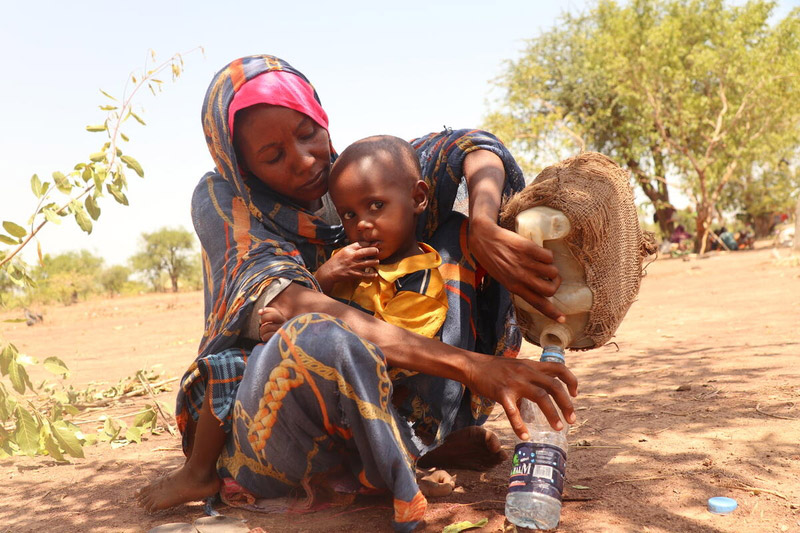For third year running, hunger and risk levels increase for refugee children worldwide, warns World Vision
Media Contact :
June 14, 2023
Senior Public Relations Manager
[email protected]
m 404-735-0871
Media Contact :
June 14, 2023
Senior Public Relations Manager
[email protected]
m 404-735-0871

SEATTLE (June 14, 2023) – Global humanitarian organization World Vision warns in a new report that hunger and violence levels experienced by refugee and displaced children around the world are continuing to increase, while funding fails to keep pace.
In the lead-up to World Refugee Day (recognized annually on June 20) the child-focused organization’s annual survey of refugee and displaced families reveals sharp increases in these two metrics, even compared to 2021 data during the COVID-19 pandemic.
“The needs of children in places like Syria, Niger, DRC and Afghanistan are now greater than they have been in years, but there is not enough funding in place to respond,” said Amanda Rives, senior director of disaster management with World Vision. “Today millions of children are struggling to exist in refugee camps. Too many are being forced to marry or work in order to survive. They are hungry. They don’t get to go to school. They don’t get to have a childhood. And the world is forgetting about them.”
The report “Invisible and forgotten: Displaced children hungrier and at more risk than ever” reveals that parents are extremely worried about the risks of violence faced by their children. “We have surveyed forcibly displaced people for three years in a row, and more families than ever [41%, up from 30% in 2022] are telling us now that their children are at increased risk of violence,” Rives explains.
In addition, hunger and lack of options are forcing them to take their children out of school and send them to work or into child marriage. Overall, nearly a third of households have a child out of school and only 11% of households are able to fully meet education expenses, down from 31% in 2022. The number of families who are borrowing from others in order to afford basic necessities like food has doubled from 2022, and 82% of families are reducing the quality and quantity of their meals to cope with lower incomes.
“Children living in displacement camps are over two times more likely to be forced to work when compared to those who live in other locations,” noted Rives. “We are extremely concerned about the especially high rates of child marriage in Afghanistan and Niger. Many families there have no access to income or food. They are being given an unimaginable choice: either allow your children to die from starvation, or sell one child into marriage so that they can eat and the dowry will enable you to feed the rest of your family.”
Most refugee families surveyed by World Vision said that they have dreams of supporting their families and rebuilding their countries. However, with so many malnourished children out of school, and with the lack of funding for increasing needs, the future for too many is bleak, even if they are one day able to return home. “There is enough money and resources in the world,” Rives said. “Hunger levels, along with child labor and child marriage figures, should not be increasing.”
“The numbers of refugees and displaced families in the world today can be overwhelming,” she continued, “but it’s important to remember that refugees can be agents of their own future. If they receive the help that they need now, they can survive, rebuild their communities and thrive. Refugees and displaced families need prioritized funding now. They deserve the means to provide for their families. Their children deserve a childhood. They deserve dignity, and they deserve to be remembered.”
About World Vision
World Vision is a Christian humanitarian organization dedicated to working with children, families and their communities worldwide to reach their full potential by tackling the causes of poverty and injustice. World Vision serves all people, regardless of religion, race, ethnicity or gender. For more information, please visit worldvision.org or follow on Twitter @WorldVisionUSA.
Report available at http://wvi.org/world-refugee-day/invisible-and-forgotten.
The survey was conducted between March and April 2023 in 18 countries – Afghanistan, Brazil, Burkina Faso, Colombia, the Democratic Republic of Congo, Ecuador, El Salvador, Ethiopia, Guatemala, Honduras, Jordan, Mali, Nicaragua, Niger, Peru, South Sudan, Uganda, and Venezuela. The survey used a mix of sampling methodologies (random, purposive, and convenience sampling) covering 847 households across all 18 countries, with an average household size of six. Please see the report annexes for full methodology.
Key Survey Findings: